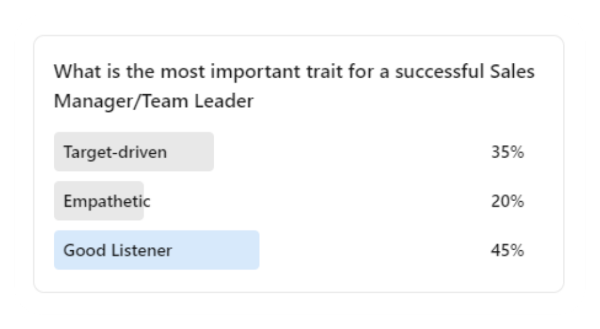A great sales manager is a complex blend of skills and traits that go beyond just being a good salesperson themselves. There are a range of traits and skills which contribute to the success of a sales team leader or sales manager, but if you had to pick just one, what would you say is most important?
We asked our LinkedIn community that very question - What is the most important trait for a successful sales manager or team leader?
The results...

Almost half (45%) of people value a boss who is a good listener
Meanwhile over one-third (35%) appreciate when managers are ambitious and target driven
For one-fifth (20%) of respondents, empathy is an essential leadership quality
The evidence is clear, employees working a sales function feel that they thrive in workplaces where they are carefully listened to, appropriately guided, and fully understood. These are the environments that boost morale and where people are able to work and develop to the best of their ability.
Being a good listener, the leadership quality that our LinkedIn community values the most, fosters feelings of respect, connection and goodwill and bolsters trust and rapport, especially when it comes to strengthening professional relationships.
Managers who received training in active listening saw a 30% improvement in employee satisfaction
Why is being a good listener so important as a sales manager?
We of course appreciate that there is an entire suite of skills required to be an effective leader, but none more so than the ability to actually listen to what colleagues and workers want and need.
However, listening is often an underrated skill in professional relationships, yet it is proven to enable critical thinking, encourage inclusivity, foster creativity and innovation, create clarity, decrease margin for error and increase staff retention.
In fact, research from reading data firm WordsRated shows that active listening can improve sales performance by 8% and collaboration and productivity by up to 25%. Managers who received training in active listening saw a 30% improvement in employee satisfaction.
The findings also showed that 80% of all workplace complaints and conflicts largely stem from poor communication and 86% of employees and executives cite the lack of effective collaboration and communication as the main causes of workplace failures.
This is why it’s incredibly important for managers to take a collaborative approach and listen to their staff members and the teams around them. Not only will this help you to secure fresh new insights, ideas and perspectives, which can push the business further, it can also maintain harmony among staff and ensure that the team is being led by a good people manager.
Listening is a powerful leadership, management, and performance tool that is easy to implement immediately, even if it does take practice to truly integrate.
How can I improve my listening skills?
Investing in listening skills is an investment in your team and your bottom line. By becoming a better listener, you can build stronger relationships, improve communication, and ultimately drive better sales results.
If you're looking for a sales manager or sales team leader job, or maybe just looking to hone your skills to advance you sales management career, there are a number of things you can do:
Don’t be too hasty
You need to show another person that what they’re saying is important so, instead of interrupting or answering too quickly, give your colleague or employee enough time to finish their story. Where necessary, allow space for silences and natural breaks in the conversation and then take the time to reflect on what they’re saying to ensure that your response is relevant and on point.
Focus on other people
Show the other person that you’re listening properly by making eye contact, nodding or smiling. Also look at the person’s body language and see what you can learn from their posture, expression and hand gestures. All this information helps you to understand and translate what it is that they’re actually attempting to communicate to you.
Mirror the words of others
Briefly summarise or repeat back what the other person has said to you and ask whether that’s correct as this allows you to avoid any misunderstandings. Reflection often feels more uncomfortable for the person doing it than for the person listening to it, but people like to have confirmation that their own thoughts and feelings have been taken seriously.
Ask the right questions
To listen effectively, you need to adopt a curious mindset to get into another person’s head and understand them. That’s why it’s useful to ask the other person for a more detailed explanation where possible, by using open questions such as ‘what happened after that?’ and ‘how did you feel when that happened?’
Don’t be judgemental
Listening can help you to see the world through another person’s eyes, in turn learning their own particular views and opinions. You won’t be able to do this if you’re already forming a judgement about them while they are still speaking. Instead, adopt an open minded attitude as you never know when this can lead to a bold new idea or way of thinking.
Learn from others
You can learn a great deal by listening to someone else about their own knowledge, experiences and ideas. You can unearth all these insights by exercising curiosity in every conversation and having a genuine desire to learn from the other person.
80% of all workplace complaints and conflicts largely stem from poor communication
And it's not just sales managers and sales team leaders that should be working on their listening skills!
The whole sales and business development team will benefit from working on their listening abilities. In the high-pressure world of sales, talking often takes centre stage. However, the ability to listen effectively might be the most underrated weapon in a salesperson's arsenal.
From building a better understanding of customer needs, to building trust and rapport, to discovering more upsell and cross-selling opportunities, listening is a skill that should be valued from the very beginning of your sales career.
There's no one-size-fits-all answer to what makes a great sales manager, as different teams and industries have specific needs. It can be said, though, that a great sales manager is someone who can consistently bring out the best in their team and achieve impressive results. They are not just salespeople themselves, but also effective leaders, coaches, and strategists.
But, while many traits contribute to great sales management, listening stands out as a cornerstone skill. It's the key to building trust, understanding needs, and making informed decisions, all of which contribute to a high-performing team and superior sales results.
If you're hiring for your sales and business development team, or looking for sales jobs in the UK, get in touch today to see how we can help.
RELATED ARTICLES
MERJE Markets: Catch up with Lauren Dono

.png)
